Reflection on Global Megatrends in Tourism and Hospitality Industries
VerifiedAdded on 2022/10/04
|8
|1846
|38
Report
AI Summary
This report presents a student's reflection on global megatrends and their implications for the tourism and hospitality industries. The student analyzes how trends such as limited natural resources, economic shifts from west to east, and the increasing significance of the virtual world will influence the future of tourism. The reflection incorporates insights from the THT3112 module, connecting theoretical concepts with personal experiences and observations. The report discusses the importance of sustainable practices, the impact of emerging economies, and the role of digital media in shaping the industry. The student emphasizes the need for conservation, adaptation to new trade relations, and the utilization of technology to enhance services and interactions within a sustainable framework. The conclusion summarizes the key learnings from the module and their relevance to the student's future career in the tourism and hospitality sector.
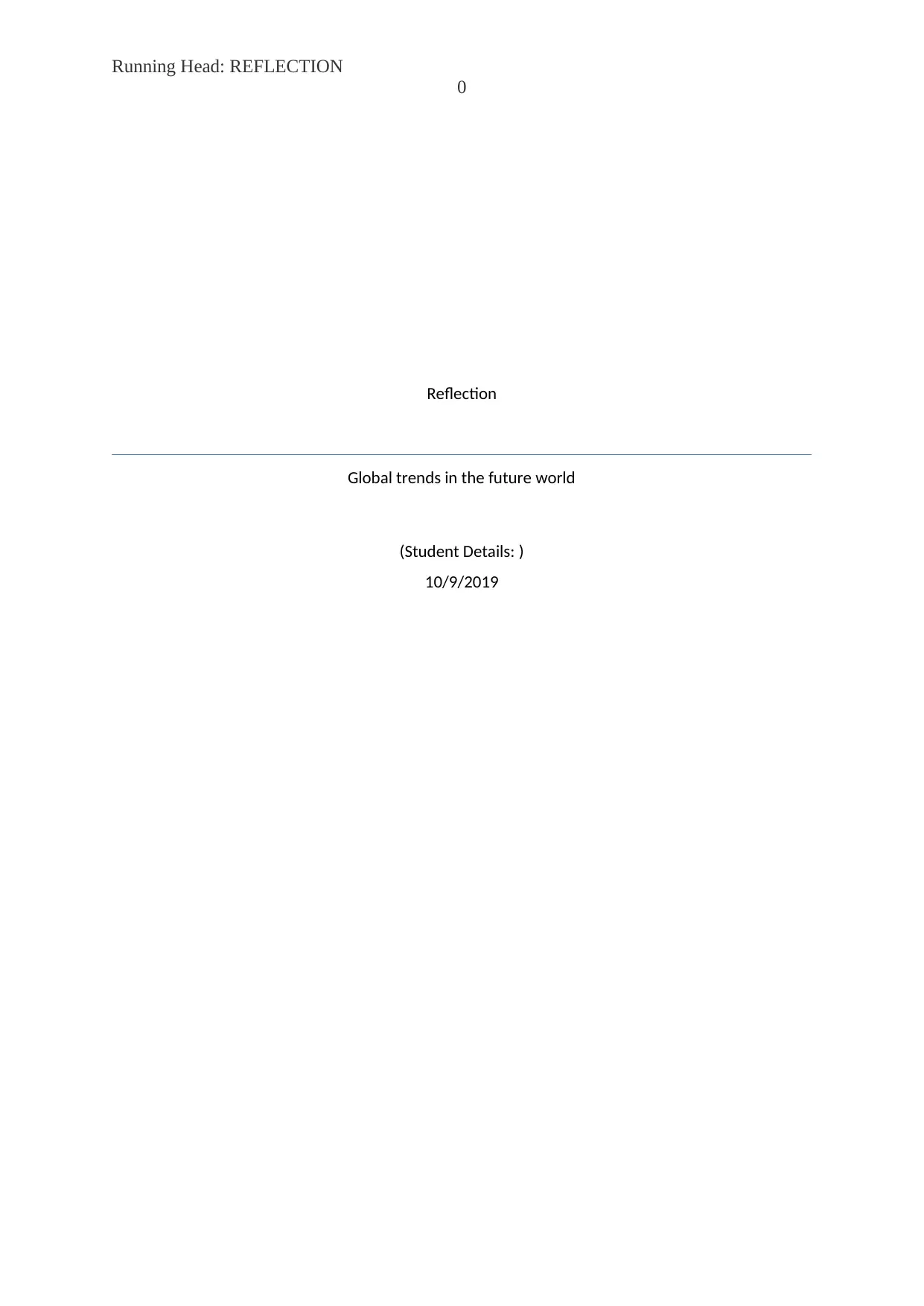
Running Head: REFLECTION
0
Reflection
Global trends in the future world
(Student Details: )
10/9/2019
0
Reflection
Global trends in the future world
(Student Details: )
10/9/2019
Paraphrase This Document
Need a fresh take? Get an instant paraphrase of this document with our AI Paraphraser
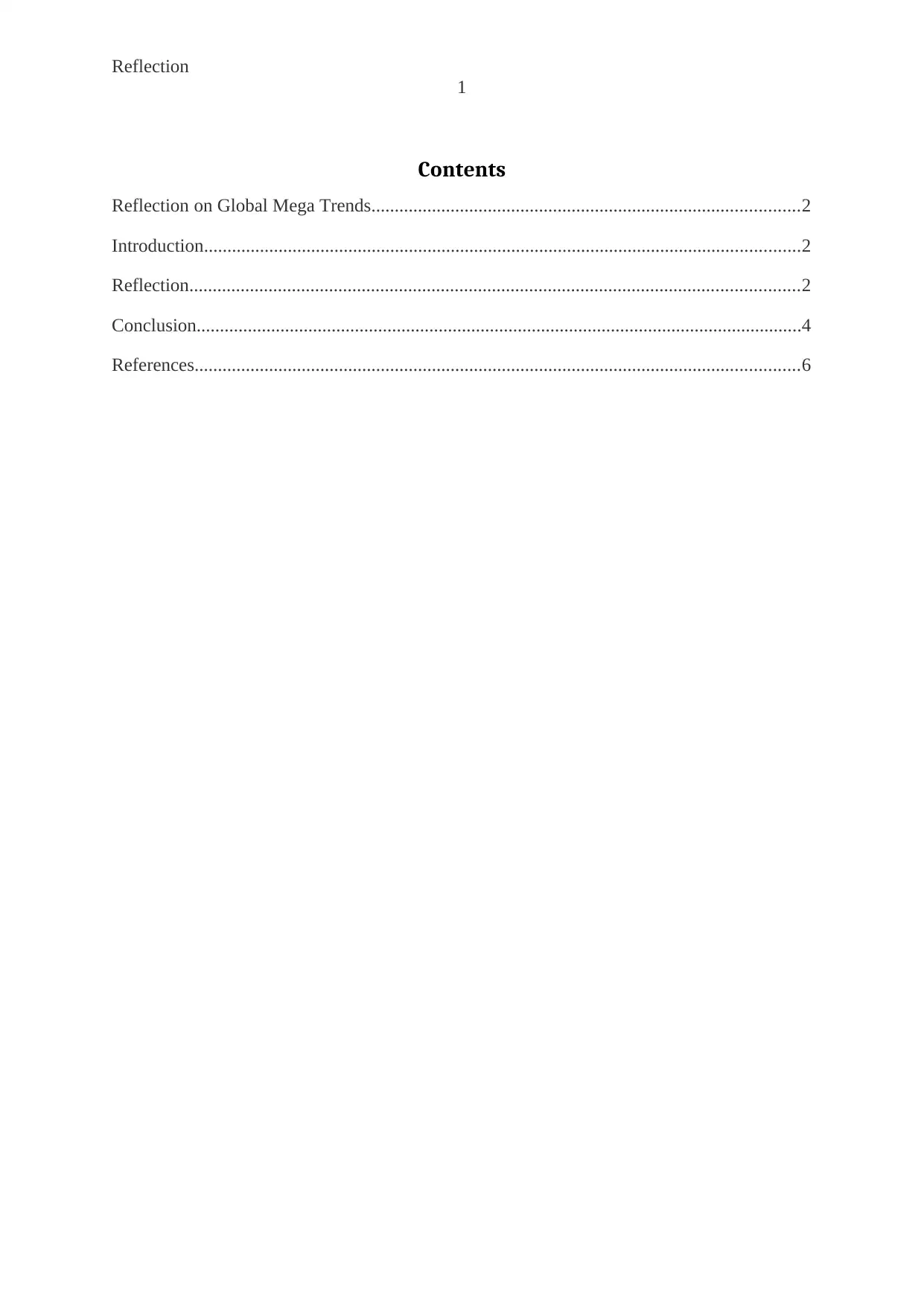
Reflection
1
Contents
Reflection on Global Mega Trends............................................................................................2
Introduction................................................................................................................................2
Reflection...................................................................................................................................2
Conclusion..................................................................................................................................4
References..................................................................................................................................6
1
Contents
Reflection on Global Mega Trends............................................................................................2
Introduction................................................................................................................................2
Reflection...................................................................................................................................2
Conclusion..................................................................................................................................4
References..................................................................................................................................6
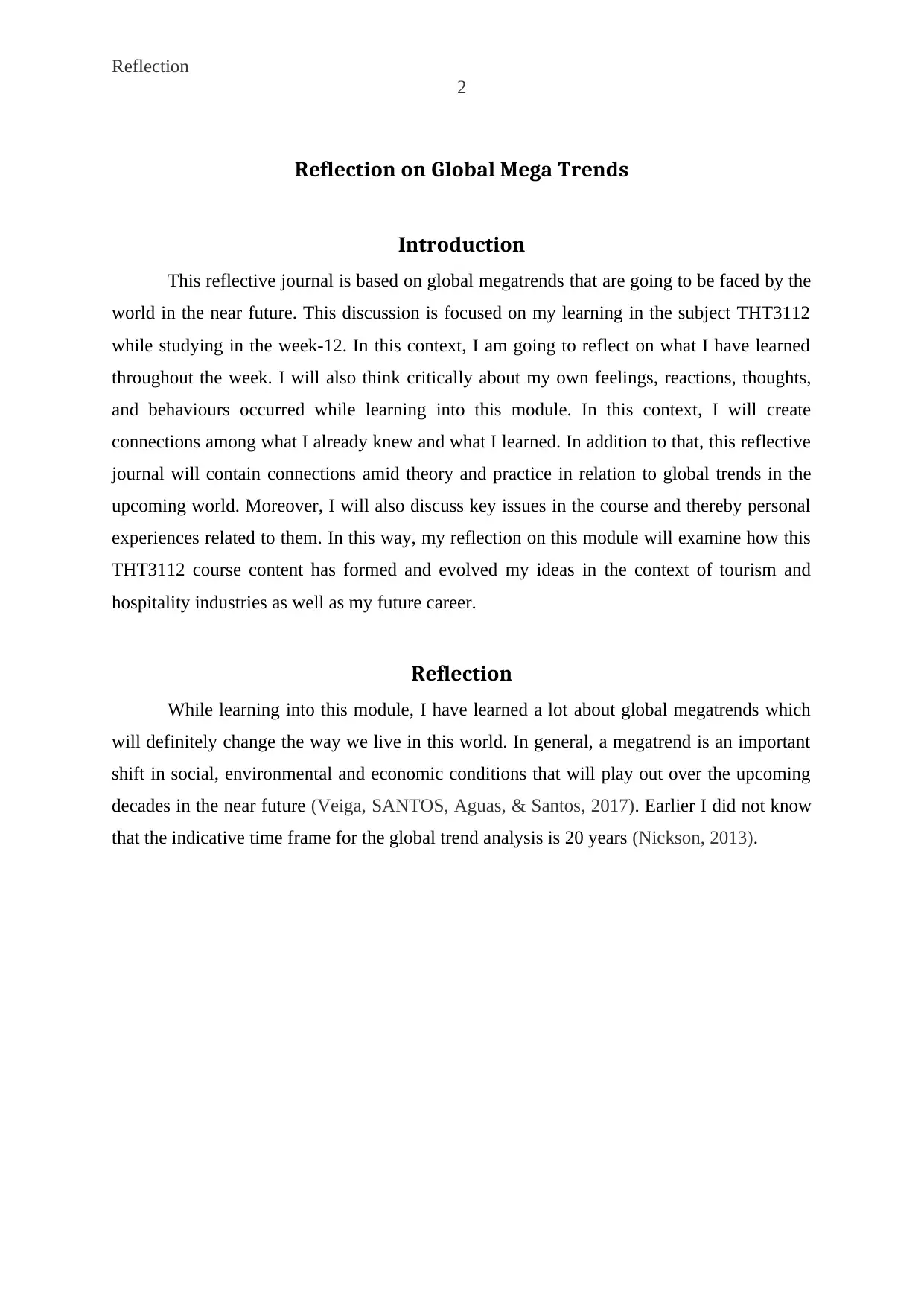
Reflection
2
Reflection on Global Mega Trends
Introduction
This reflective journal is based on global megatrends that are going to be faced by the
world in the near future. This discussion is focused on my learning in the subject THT3112
while studying in the week-12. In this context, I am going to reflect on what I have learned
throughout the week. I will also think critically about my own feelings, reactions, thoughts,
and behaviours occurred while learning into this module. In this context, I will create
connections among what I already knew and what I learned. In addition to that, this reflective
journal will contain connections amid theory and practice in relation to global trends in the
upcoming world. Moreover, I will also discuss key issues in the course and thereby personal
experiences related to them. In this way, my reflection on this module will examine how this
THT3112 course content has formed and evolved my ideas in the context of tourism and
hospitality industries as well as my future career.
Reflection
While learning into this module, I have learned a lot about global megatrends which
will definitely change the way we live in this world. In general, a megatrend is an important
shift in social, environmental and economic conditions that will play out over the upcoming
decades in the near future (Veiga, SANTOS, Aguas, & Santos, 2017). Earlier I did not know
that the indicative time frame for the global trend analysis is 20 years (Nickson, 2013).
2
Reflection on Global Mega Trends
Introduction
This reflective journal is based on global megatrends that are going to be faced by the
world in the near future. This discussion is focused on my learning in the subject THT3112
while studying in the week-12. In this context, I am going to reflect on what I have learned
throughout the week. I will also think critically about my own feelings, reactions, thoughts,
and behaviours occurred while learning into this module. In this context, I will create
connections among what I already knew and what I learned. In addition to that, this reflective
journal will contain connections amid theory and practice in relation to global trends in the
upcoming world. Moreover, I will also discuss key issues in the course and thereby personal
experiences related to them. In this way, my reflection on this module will examine how this
THT3112 course content has formed and evolved my ideas in the context of tourism and
hospitality industries as well as my future career.
Reflection
While learning into this module, I have learned a lot about global megatrends which
will definitely change the way we live in this world. In general, a megatrend is an important
shift in social, environmental and economic conditions that will play out over the upcoming
decades in the near future (Veiga, SANTOS, Aguas, & Santos, 2017). Earlier I did not know
that the indicative time frame for the global trend analysis is 20 years (Nickson, 2013).
⊘ This is a preview!⊘
Do you want full access?
Subscribe today to unlock all pages.

Trusted by 1+ million students worldwide
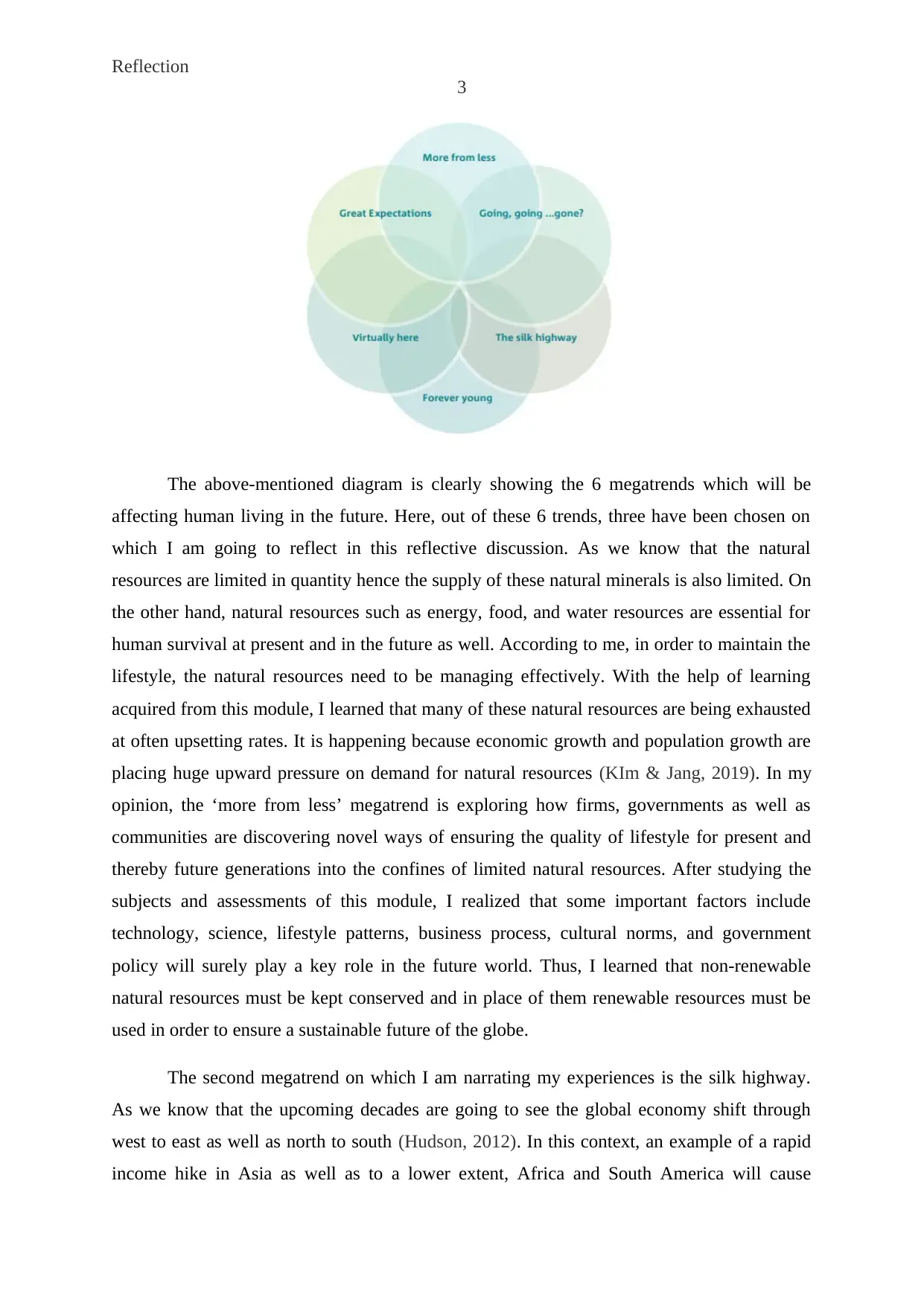
Reflection
3
The above-mentioned diagram is clearly showing the 6 megatrends which will be
affecting human living in the future. Here, out of these 6 trends, three have been chosen on
which I am going to reflect in this reflective discussion. As we know that the natural
resources are limited in quantity hence the supply of these natural minerals is also limited. On
the other hand, natural resources such as energy, food, and water resources are essential for
human survival at present and in the future as well. According to me, in order to maintain the
lifestyle, the natural resources need to be managing effectively. With the help of learning
acquired from this module, I learned that many of these natural resources are being exhausted
at often upsetting rates. It is happening because economic growth and population growth are
placing huge upward pressure on demand for natural resources (KIm & Jang, 2019). In my
opinion, the ‘more from less’ megatrend is exploring how firms, governments as well as
communities are discovering novel ways of ensuring the quality of lifestyle for present and
thereby future generations into the confines of limited natural resources. After studying the
subjects and assessments of this module, I realized that some important factors include
technology, science, lifestyle patterns, business process, cultural norms, and government
policy will surely play a key role in the future world. Thus, I learned that non-renewable
natural resources must be kept conserved and in place of them renewable resources must be
used in order to ensure a sustainable future of the globe.
The second megatrend on which I am narrating my experiences is the silk highway.
As we know that the upcoming decades are going to see the global economy shift through
west to east as well as north to south (Hudson, 2012). In this context, an example of a rapid
income hike in Asia as well as to a lower extent, Africa and South America will cause
3
The above-mentioned diagram is clearly showing the 6 megatrends which will be
affecting human living in the future. Here, out of these 6 trends, three have been chosen on
which I am going to reflect in this reflective discussion. As we know that the natural
resources are limited in quantity hence the supply of these natural minerals is also limited. On
the other hand, natural resources such as energy, food, and water resources are essential for
human survival at present and in the future as well. According to me, in order to maintain the
lifestyle, the natural resources need to be managing effectively. With the help of learning
acquired from this module, I learned that many of these natural resources are being exhausted
at often upsetting rates. It is happening because economic growth and population growth are
placing huge upward pressure on demand for natural resources (KIm & Jang, 2019). In my
opinion, the ‘more from less’ megatrend is exploring how firms, governments as well as
communities are discovering novel ways of ensuring the quality of lifestyle for present and
thereby future generations into the confines of limited natural resources. After studying the
subjects and assessments of this module, I realized that some important factors include
technology, science, lifestyle patterns, business process, cultural norms, and government
policy will surely play a key role in the future world. Thus, I learned that non-renewable
natural resources must be kept conserved and in place of them renewable resources must be
used in order to ensure a sustainable future of the globe.
The second megatrend on which I am narrating my experiences is the silk highway.
As we know that the upcoming decades are going to see the global economy shift through
west to east as well as north to south (Hudson, 2012). In this context, an example of a rapid
income hike in Asia as well as to a lower extent, Africa and South America will cause
Paraphrase This Document
Need a fresh take? Get an instant paraphrase of this document with our AI Paraphraser
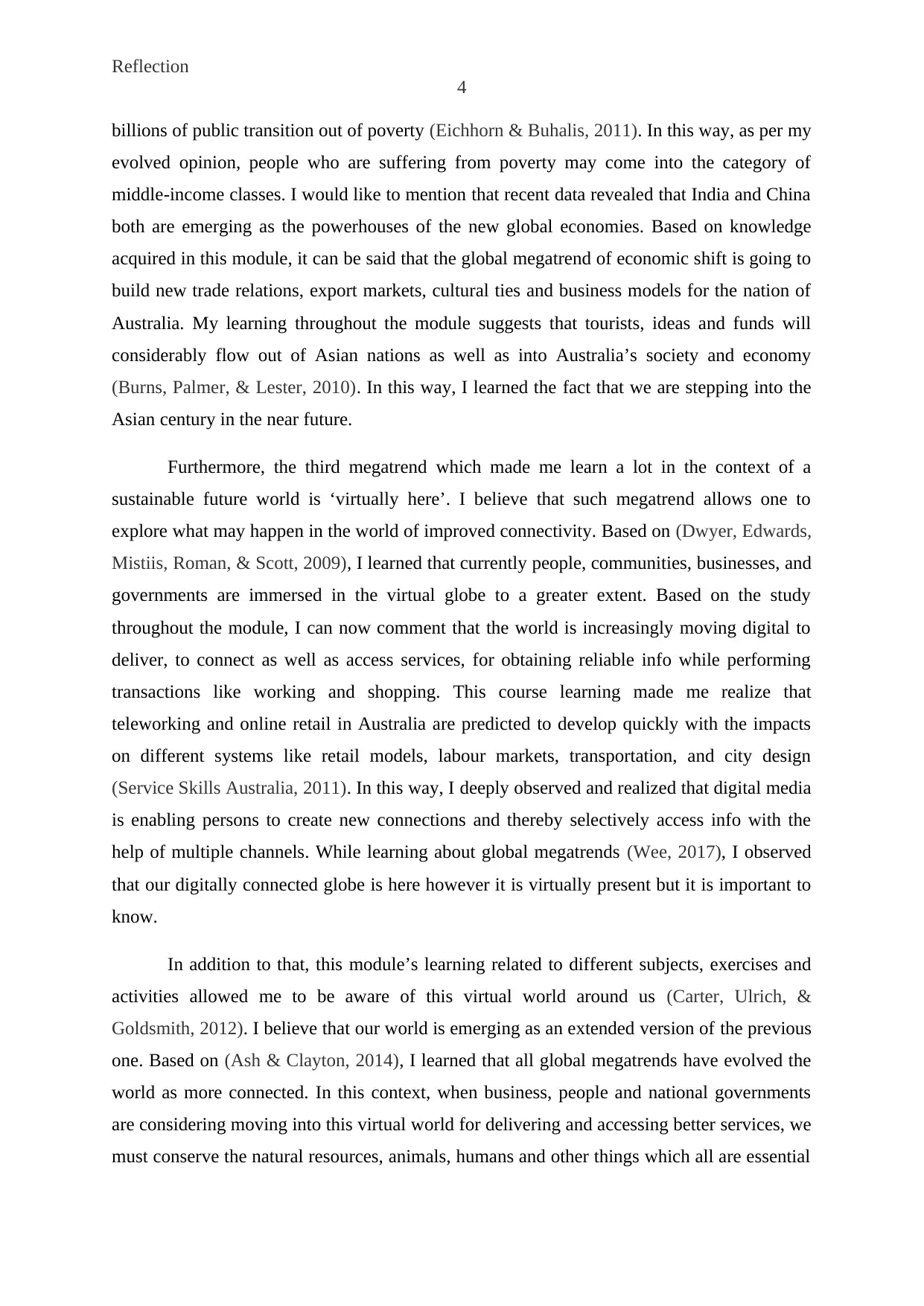
Reflection
4
billions of public transition out of poverty (Eichhorn & Buhalis, 2011). In this way, as per my
evolved opinion, people who are suffering from poverty may come into the category of
middle-income classes. I would like to mention that recent data revealed that India and China
both are emerging as the powerhouses of the new global economies. Based on knowledge
acquired in this module, it can be said that the global megatrend of economic shift is going to
build new trade relations, export markets, cultural ties and business models for the nation of
Australia. My learning throughout the module suggests that tourists, ideas and funds will
considerably flow out of Asian nations as well as into Australia’s society and economy
(Burns, Palmer, & Lester, 2010). In this way, I learned the fact that we are stepping into the
Asian century in the near future.
Furthermore, the third megatrend which made me learn a lot in the context of a
sustainable future world is ‘virtually here’. I believe that such megatrend allows one to
explore what may happen in the world of improved connectivity. Based on (Dwyer, Edwards,
Mistiis, Roman, & Scott, 2009), I learned that currently people, communities, businesses, and
governments are immersed in the virtual globe to a greater extent. Based on the study
throughout the module, I can now comment that the world is increasingly moving digital to
deliver, to connect as well as access services, for obtaining reliable info while performing
transactions like working and shopping. This course learning made me realize that
teleworking and online retail in Australia are predicted to develop quickly with the impacts
on different systems like retail models, labour markets, transportation, and city design
(Service Skills Australia, 2011). In this way, I deeply observed and realized that digital media
is enabling persons to create new connections and thereby selectively access info with the
help of multiple channels. While learning about global megatrends (Wee, 2017), I observed
that our digitally connected globe is here however it is virtually present but it is important to
know.
In addition to that, this module’s learning related to different subjects, exercises and
activities allowed me to be aware of this virtual world around us (Carter, Ulrich, &
Goldsmith, 2012). I believe that our world is emerging as an extended version of the previous
one. Based on (Ash & Clayton, 2014), I learned that all global megatrends have evolved the
world as more connected. In this context, when business, people and national governments
are considering moving into this virtual world for delivering and accessing better services, we
must conserve the natural resources, animals, humans and other things which all are essential
4
billions of public transition out of poverty (Eichhorn & Buhalis, 2011). In this way, as per my
evolved opinion, people who are suffering from poverty may come into the category of
middle-income classes. I would like to mention that recent data revealed that India and China
both are emerging as the powerhouses of the new global economies. Based on knowledge
acquired in this module, it can be said that the global megatrend of economic shift is going to
build new trade relations, export markets, cultural ties and business models for the nation of
Australia. My learning throughout the module suggests that tourists, ideas and funds will
considerably flow out of Asian nations as well as into Australia’s society and economy
(Burns, Palmer, & Lester, 2010). In this way, I learned the fact that we are stepping into the
Asian century in the near future.
Furthermore, the third megatrend which made me learn a lot in the context of a
sustainable future world is ‘virtually here’. I believe that such megatrend allows one to
explore what may happen in the world of improved connectivity. Based on (Dwyer, Edwards,
Mistiis, Roman, & Scott, 2009), I learned that currently people, communities, businesses, and
governments are immersed in the virtual globe to a greater extent. Based on the study
throughout the module, I can now comment that the world is increasingly moving digital to
deliver, to connect as well as access services, for obtaining reliable info while performing
transactions like working and shopping. This course learning made me realize that
teleworking and online retail in Australia are predicted to develop quickly with the impacts
on different systems like retail models, labour markets, transportation, and city design
(Service Skills Australia, 2011). In this way, I deeply observed and realized that digital media
is enabling persons to create new connections and thereby selectively access info with the
help of multiple channels. While learning about global megatrends (Wee, 2017), I observed
that our digitally connected globe is here however it is virtually present but it is important to
know.
In addition to that, this module’s learning related to different subjects, exercises and
activities allowed me to be aware of this virtual world around us (Carter, Ulrich, &
Goldsmith, 2012). I believe that our world is emerging as an extended version of the previous
one. Based on (Ash & Clayton, 2014), I learned that all global megatrends have evolved the
world as more connected. In this context, when business, people and national governments
are considering moving into this virtual world for delivering and accessing better services, we
must conserve the natural resources, animals, humans and other things which all are essential
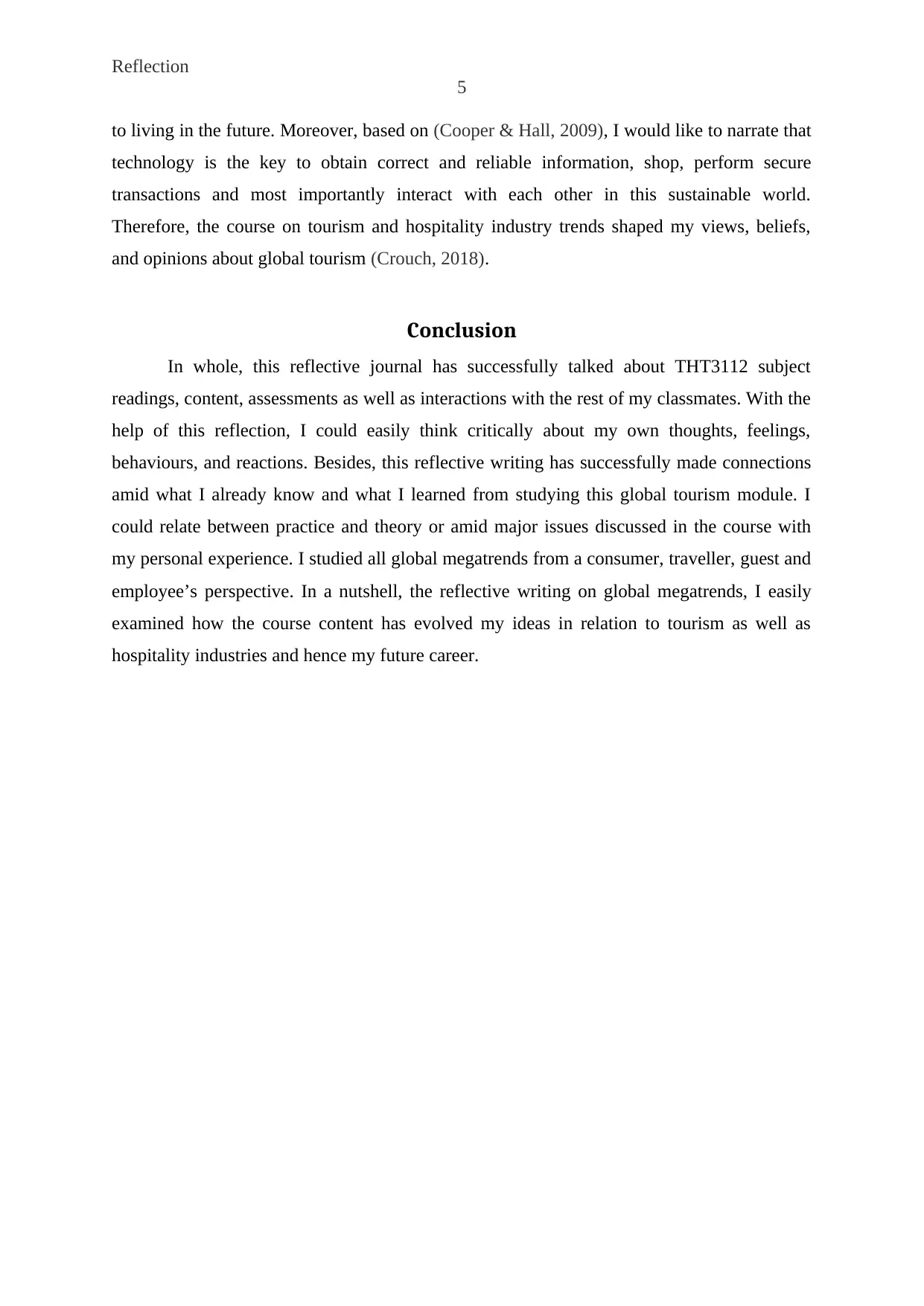
Reflection
5
to living in the future. Moreover, based on (Cooper & Hall, 2009), I would like to narrate that
technology is the key to obtain correct and reliable information, shop, perform secure
transactions and most importantly interact with each other in this sustainable world.
Therefore, the course on tourism and hospitality industry trends shaped my views, beliefs,
and opinions about global tourism (Crouch, 2018).
Conclusion
In whole, this reflective journal has successfully talked about THT3112 subject
readings, content, assessments as well as interactions with the rest of my classmates. With the
help of this reflection, I could easily think critically about my own thoughts, feelings,
behaviours, and reactions. Besides, this reflective writing has successfully made connections
amid what I already know and what I learned from studying this global tourism module. I
could relate between practice and theory or amid major issues discussed in the course with
my personal experience. I studied all global megatrends from a consumer, traveller, guest and
employee’s perspective. In a nutshell, the reflective writing on global megatrends, I easily
examined how the course content has evolved my ideas in relation to tourism as well as
hospitality industries and hence my future career.
5
to living in the future. Moreover, based on (Cooper & Hall, 2009), I would like to narrate that
technology is the key to obtain correct and reliable information, shop, perform secure
transactions and most importantly interact with each other in this sustainable world.
Therefore, the course on tourism and hospitality industry trends shaped my views, beliefs,
and opinions about global tourism (Crouch, 2018).
Conclusion
In whole, this reflective journal has successfully talked about THT3112 subject
readings, content, assessments as well as interactions with the rest of my classmates. With the
help of this reflection, I could easily think critically about my own thoughts, feelings,
behaviours, and reactions. Besides, this reflective writing has successfully made connections
amid what I already know and what I learned from studying this global tourism module. I
could relate between practice and theory or amid major issues discussed in the course with
my personal experience. I studied all global megatrends from a consumer, traveller, guest and
employee’s perspective. In a nutshell, the reflective writing on global megatrends, I easily
examined how the course content has evolved my ideas in relation to tourism as well as
hospitality industries and hence my future career.
⊘ This is a preview!⊘
Do you want full access?
Subscribe today to unlock all pages.

Trusted by 1+ million students worldwide
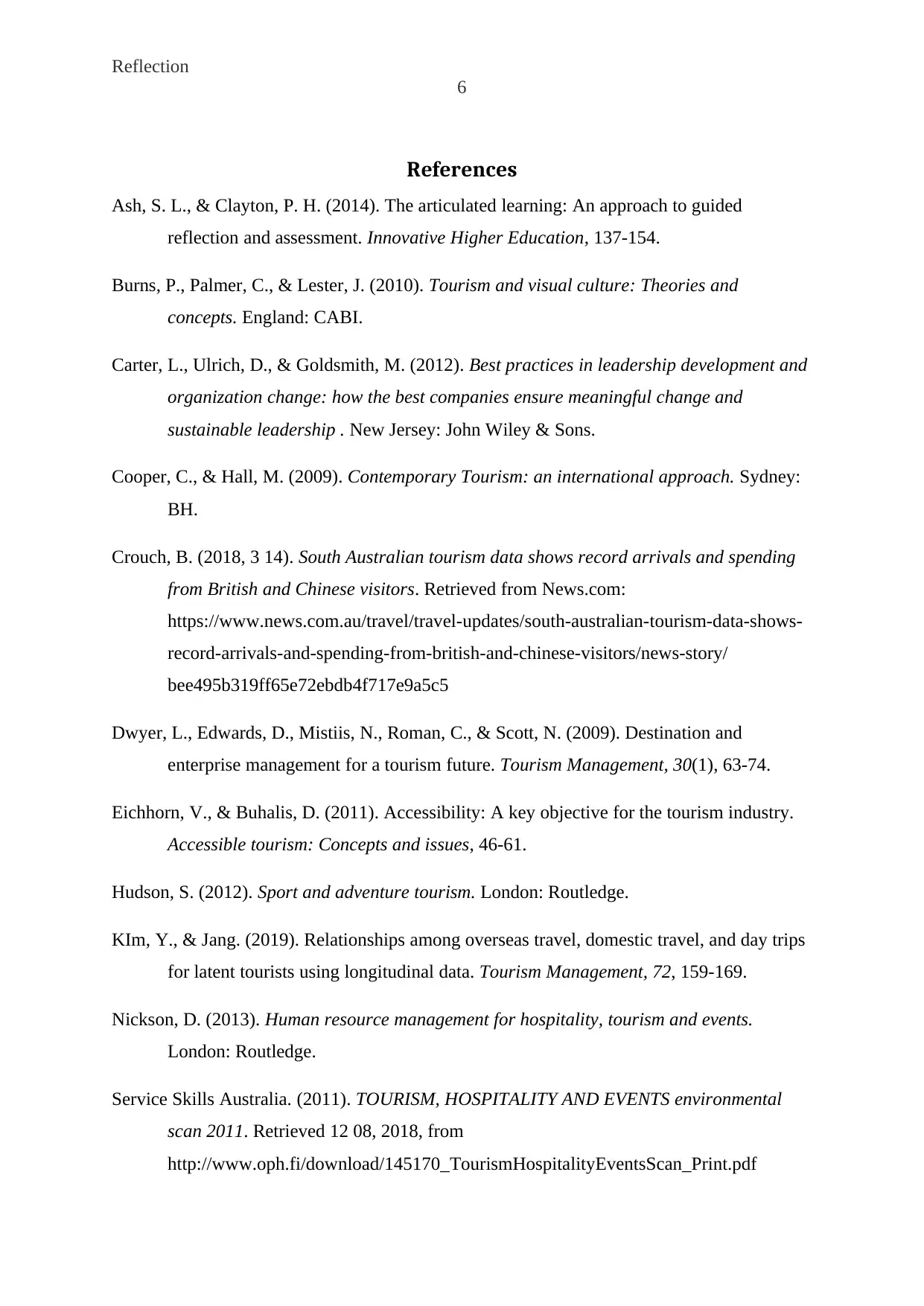
Reflection
6
References
Ash, S. L., & Clayton, P. H. (2014). The articulated learning: An approach to guided
reflection and assessment. Innovative Higher Education, 137-154.
Burns, P., Palmer, C., & Lester, J. (2010). Tourism and visual culture: Theories and
concepts. England: CABI.
Carter, L., Ulrich, D., & Goldsmith, M. (2012). Best practices in leadership development and
organization change: how the best companies ensure meaningful change and
sustainable leadership . New Jersey: John Wiley & Sons.
Cooper, C., & Hall, M. (2009). Contemporary Tourism: an international approach. Sydney:
BH.
Crouch, B. (2018, 3 14). South Australian tourism data shows record arrivals and spending
from British and Chinese visitors. Retrieved from News.com:
https://www.news.com.au/travel/travel-updates/south-australian-tourism-data-shows-
record-arrivals-and-spending-from-british-and-chinese-visitors/news-story/
bee495b319ff65e72ebdb4f717e9a5c5
Dwyer, L., Edwards, D., Mistiis, N., Roman, C., & Scott, N. (2009). Destination and
enterprise management for a tourism future. Tourism Management, 30(1), 63-74.
Eichhorn, V., & Buhalis, D. (2011). Accessibility: A key objective for the tourism industry.
Accessible tourism: Concepts and issues, 46-61.
Hudson, S. (2012). Sport and adventure tourism. London: Routledge.
KIm, Y., & Jang. (2019). Relationships among overseas travel, domestic travel, and day trips
for latent tourists using longitudinal data. Tourism Management, 72, 159-169.
Nickson, D. (2013). Human resource management for hospitality, tourism and events.
London: Routledge.
Service Skills Australia. (2011). TOURISM, HOSPITALITY AND EVENTS environmental
scan 2011. Retrieved 12 08, 2018, from
http://www.oph.fi/download/145170_TourismHospitalityEventsScan_Print.pdf
6
References
Ash, S. L., & Clayton, P. H. (2014). The articulated learning: An approach to guided
reflection and assessment. Innovative Higher Education, 137-154.
Burns, P., Palmer, C., & Lester, J. (2010). Tourism and visual culture: Theories and
concepts. England: CABI.
Carter, L., Ulrich, D., & Goldsmith, M. (2012). Best practices in leadership development and
organization change: how the best companies ensure meaningful change and
sustainable leadership . New Jersey: John Wiley & Sons.
Cooper, C., & Hall, M. (2009). Contemporary Tourism: an international approach. Sydney:
BH.
Crouch, B. (2018, 3 14). South Australian tourism data shows record arrivals and spending
from British and Chinese visitors. Retrieved from News.com:
https://www.news.com.au/travel/travel-updates/south-australian-tourism-data-shows-
record-arrivals-and-spending-from-british-and-chinese-visitors/news-story/
bee495b319ff65e72ebdb4f717e9a5c5
Dwyer, L., Edwards, D., Mistiis, N., Roman, C., & Scott, N. (2009). Destination and
enterprise management for a tourism future. Tourism Management, 30(1), 63-74.
Eichhorn, V., & Buhalis, D. (2011). Accessibility: A key objective for the tourism industry.
Accessible tourism: Concepts and issues, 46-61.
Hudson, S. (2012). Sport and adventure tourism. London: Routledge.
KIm, Y., & Jang. (2019). Relationships among overseas travel, domestic travel, and day trips
for latent tourists using longitudinal data. Tourism Management, 72, 159-169.
Nickson, D. (2013). Human resource management for hospitality, tourism and events.
London: Routledge.
Service Skills Australia. (2011). TOURISM, HOSPITALITY AND EVENTS environmental
scan 2011. Retrieved 12 08, 2018, from
http://www.oph.fi/download/145170_TourismHospitalityEventsScan_Print.pdf
Paraphrase This Document
Need a fresh take? Get an instant paraphrase of this document with our AI Paraphraser
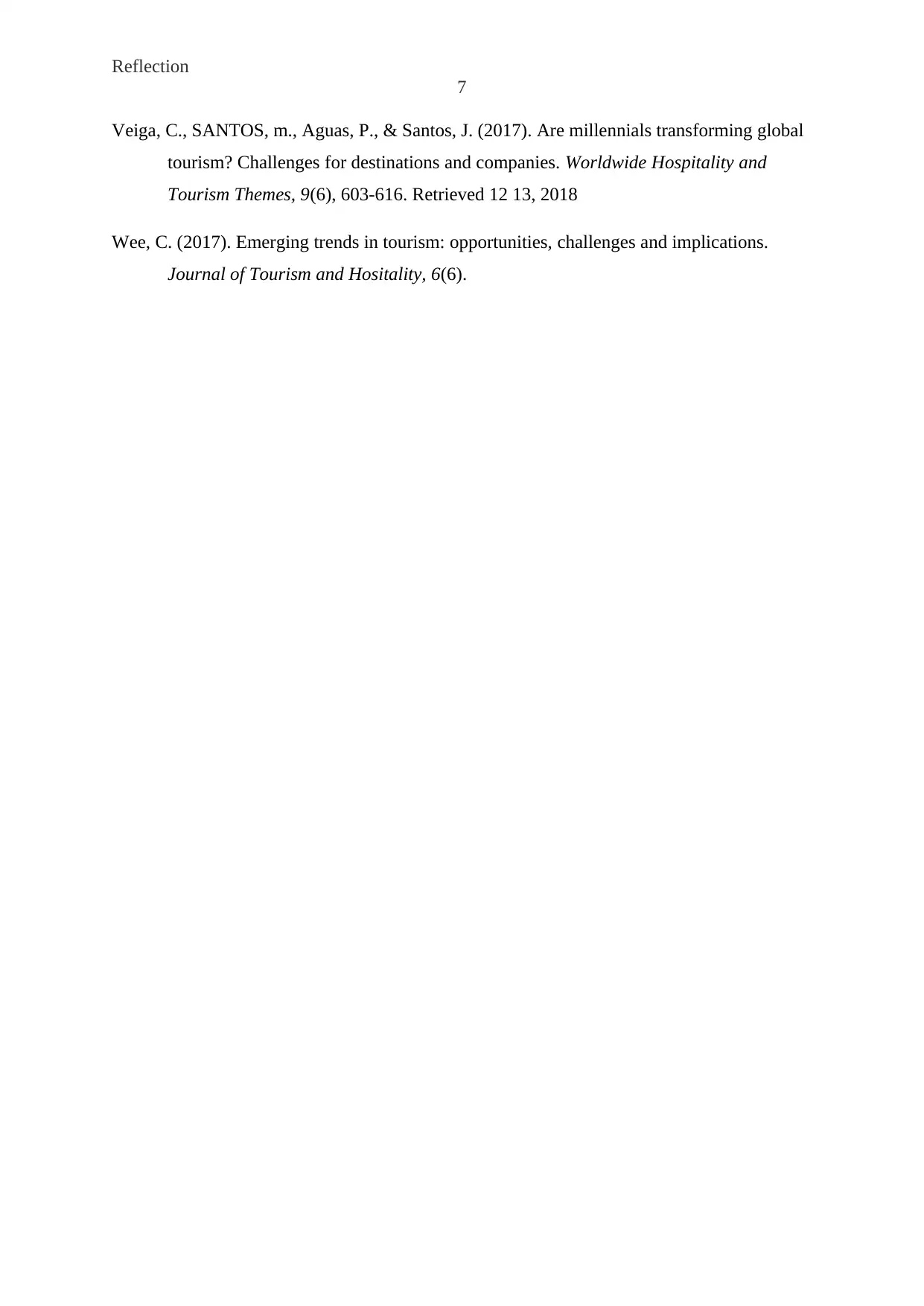
Reflection
7
Veiga, C., SANTOS, m., Aguas, P., & Santos, J. (2017). Are millennials transforming global
tourism? Challenges for destinations and companies. Worldwide Hospitality and
Tourism Themes, 9(6), 603-616. Retrieved 12 13, 2018
Wee, C. (2017). Emerging trends in tourism: opportunities, challenges and implications.
Journal of Tourism and Hositality, 6(6).
7
Veiga, C., SANTOS, m., Aguas, P., & Santos, J. (2017). Are millennials transforming global
tourism? Challenges for destinations and companies. Worldwide Hospitality and
Tourism Themes, 9(6), 603-616. Retrieved 12 13, 2018
Wee, C. (2017). Emerging trends in tourism: opportunities, challenges and implications.
Journal of Tourism and Hositality, 6(6).
1 out of 8
Related Documents
Your All-in-One AI-Powered Toolkit for Academic Success.
+13062052269
info@desklib.com
Available 24*7 on WhatsApp / Email
![[object Object]](/_next/static/media/star-bottom.7253800d.svg)
Unlock your academic potential
Copyright © 2020–2025 A2Z Services. All Rights Reserved. Developed and managed by ZUCOL.





